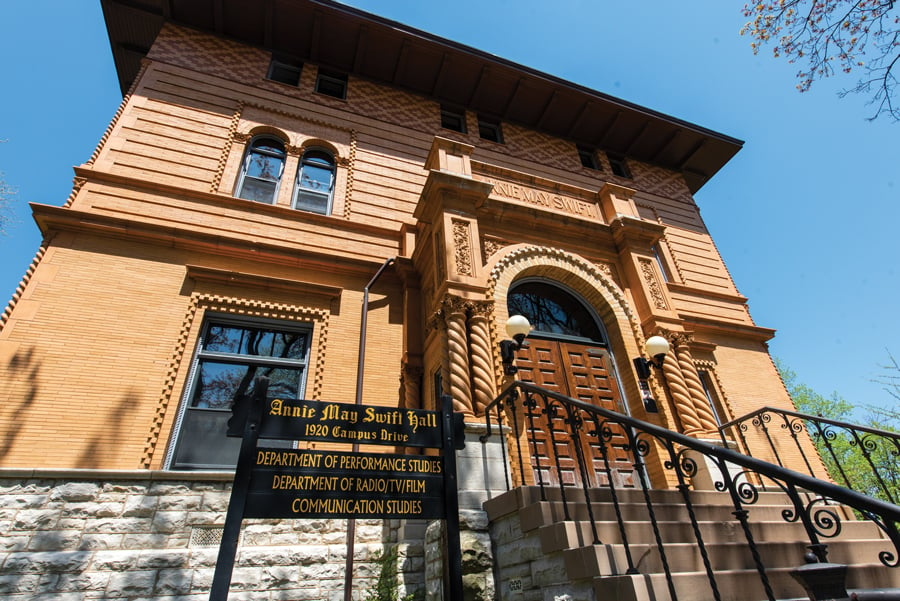Communication graduate students put up all-gender restroom signs, advocate for access
Daily file photo by Allie Goulding
Graduate students at the School of Communication started hanging up all-gender restroom signs in Annie May Swift Hall as an act of protest. They hope this can spur the University put pressure on the Evanston government to alter code number 2902.4.
February 7, 2020
After a year of advocacy, Communication graduate students started hanging up all-gender restroom signs in Annie May Swift Hall as an act of protest.
It’s not the first time that students have resorted to public activism to advocate for bathroom access for transgender, non-binary and gender non-conforming members of the Northwestern community.
A group of anonymous SESP students started to put up all-gender bathroom signs in Annenberg Hall during Fall Quarter. Seeing this, the Communication graduate students decided to add to the effort.
“All of our bureaucratic advocacy wasn’t working,” Lauren Herold, a doctorate student who has advocated for all-gender restrooms, said. “We want to preserve that trans and nonbinary students and faculty and staff deserve access to these bathrooms in our building.”
The activists hope this action can urge the University to put pressure on the Evanston government to alter a portion of the city code, which states that “for public facilities that have multiple occupancy restrooms, signs shall indicate that the multiple occupancy restrooms are either designated for men or for women.”
Alternatively, if a public building has one single-occupancy restroom, it is designated all-gender. If it has two single-occupancy restrooms, one is designated for males and the other, for females. If the building has three or more, the third bathroom and beyond are designated all-gender, according to the city code.
Annie May Swift and Annenberg Halls only have multiple-stall restrooms. Students and faculty who identify as transgender, non-binary or gender non-conforming have no choice but to use gendered restrooms or walk to the nearest accommodation.
Rey Tang, a Communication junior who identifies as transgender, said she used all-gender restrooms while transitioning in her second year at Northwestern. While she did not have classes in Annie May Swift, she said she used to work at John J. Louis Hall, which did not have all-gender restrooms and she had to tell a coworker that she had to leave the building to use one in Kresge Centennial Hall.
“(It’s) blocking people from a basic right because of their gender identity,” Tang said.
Transgender and non-binary individuals should not have to ask for bathroom access, Herold said, and the Evanston code should be changed. The students reached out to Ald. Eleanor Revelle (7th), who was been supportive, Herold said. There has not been action from Evanston’s City Council.
The group has also reached out to administrators of the buildings and Multicultural Student Affairs, which were supportive of the code change but did not give a definitive response. Students involved in the effort at both buildings recounted supportive responses from administrators, who slowly stopped responding.
Doctorate student Cara Dickason said the spirit of the current law was to make bathrooms more equitable in a time when women were just entering the University. The lack of new action goes against the virtue of the code, she said.
“It’s very frustrating that the changes we’re proposing are obviously not to take bathrooms away from anyone,” Dickason said, “but to make them even more equitable.”
Dickason said the bureaucracy and the University’s unwillingness to make a “bold,” progressive stance, is keeping individuals from getting the bathroom access they deserve.
In 2017, Northwestern made headlines when it became the first major Chicago university to open a multi-occupancy, gender-neutral bathroom in its Chicago campus. The University designated its first all-gender restroom in 2014 in Norris University Center.
Still, the University’s queer communities say this is not enough.
The Queer Pride Graduate Student Association in 2019 identified bathrooms as one of the top most important issues for genderqueer, nonbinary and transgender students. It also said students have reported being stopped by other students or staff who perceived they were going into the incorrect bathrooms. It also reported that a student developed urinary tract infections and bladder infections because of their inability to access a bathroom facility.
Matt Abtahi, an assistant director at Multicultural Student Affairs, said bathrooms are not just the concern for accessibility, but lead to forcible gender assignments, due to the lack of available all-gender restroom facilities on campus.
“When they go in those spaces, they are policed by other members of the university community,” Abtahi said, “which is just inevitably harmful to their experience while here at Northwestern.”
A source who asked to remain anonymous for privacy-related concerns said they put up the signs in Annenberg. They told The Daily they know many transgender and nonbinary students in SESP who have to walk up to 15 minutes to access the nearest all-gender bathroom.
The time that transgender and non-binary students have to waste to access suitable restrooms also shows a trend of a lack of awareness on campus, they said.
“We have no idea whether or not (the University) working on this, and how they’re working on it,” they said. “It just feels like if there’s no tangible, like something that’s not in the face of the administration every day, they can just wave their hand at it, and like, make it go away.”
In an email to the Daily, University spokesperson Bob Rowley said the University works to provide a “safe and inclusive environment” for everyone, including non-conforming and trans staff, faculty, and students.
“This includes providing and designating All-Gender Restroom facilities to provide a safe and welcoming space for individuals who may identify as transgender or outside of the male/female gender binary,“ Rowley said.
Email: [email protected]
Twitter: @yunkyomoonk
Related Stories:
– Northwestern Office of Equity releases 2019 Campus Climate Survey
– Vigil memorializes deaths of transgender individuals
– Residential Services expands gender-open housing












